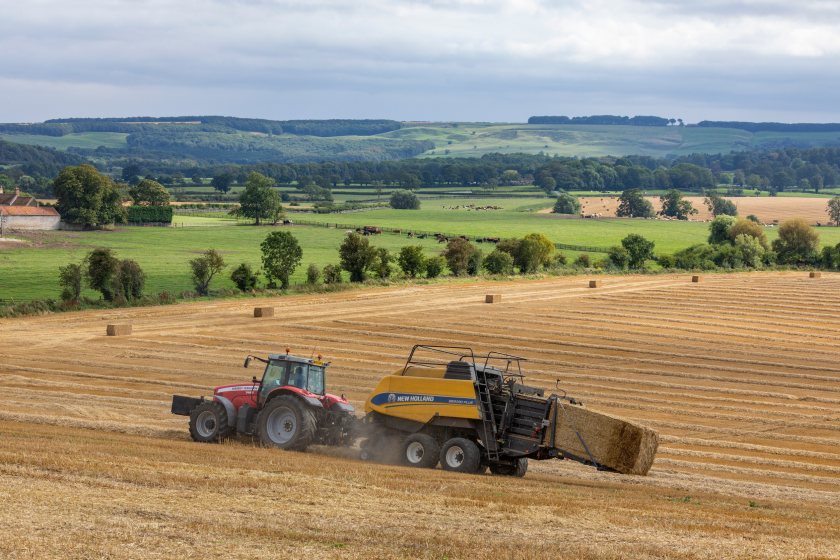UK risks losing third of food production by 2050, report warns

The UK could see food production fall by almost a third within the next 25 years unless urgent reforms to farming and land-use policy are made, a new parliamentary report has warned.
Research has revealed that government targets for house building, nature recovery, renewable energy, tree planting and infrastructure could together remove up to a quarter of Britain’s farmed land by 2050 — much of it high-quality arable ground.
The All-Party Parliamentary Group on Science and Technology in Agriculture (APPGSTA) study, led by Dr Derrick Wilkinson, former chief economist at the NFU, found that without a renewed focus on productivity and innovation, domestic food output could drop by 32% by 2050, or 39% per capita, at current growth rates.
The APPGSTA is calling for the government to adopt its 30:50:50 mission — a framework aimed at boosting UK agricultural output by 30% while cutting the sector’s environmental footprint by half by 2050.
The proposal is set out in the group’s new report, which urges ministers to embed the 30:50:50 framework as a cross-departmental reference point for all food, farming and land-use policies and to establish a statutory target of 75% food self-sufficiency by mid-century.
Speaking at the launch, APPGSTA chair George Freeman MP warned that British agriculture stood “at a tipping point”. “Despite favourable growing conditions, world-class agri-science, and a highly professional farming sector, UK agricultural productivity growth has stalled,” he said.
He criticised “fragmented support policies, inconsistent regulation and a failure to translate scientific advances into practice”, which he said had left the sector “constrained” and increasingly vulnerable to external shocks.
“Without radical policy reform, the UK risks further erosion of its food self-sufficiency and growing reliance on imports at a time when geopolitical instability and climate extremes threaten global food supply chains,” he added.
Freeman acknowledged that the government’s Food Strategy, published in July, set out “the right ambition” for a healthier, more sustainable food system.
However, he warned that these aims risked being undermined by competing departmental priorities, particularly the expansion of industrial-scale solar farms and infrastructure on productive agricultural land. “We simply cannot afford to lose prime farmland to meet renewable energy targets,” he said.
He argued that the 30:50:50 framework offered “a joined-up, cross-government response” to the challenges of population growth, climate change and global instability, ensuring the UK remains both competitive and self-sufficient.
Following extensive consultation with more than 100 organisations across the food and farming sector, the APPGSTA report identified broad consensus around three key themes.
There is widespread support for the 30:50:50 ambition as a unifying long-term framework aligning productivity, sustainability and innovation goals.
However, the report concludes that the current policy environment is not fit for purpose, citing a lack of focus on food production, inconsistent and risk-averse regulation, limited translation of research into practice, and underinvestment in infrastructure and skills.
It also emphasises that science, technology and innovation must underpin the UK’s future agricultural strategy. Central to this vision is the creation of a new National Farm Data Initiative (NFDI) to benchmark progress, harmonise data collection and enable interoperability between systems to improve transparency and performance measurement.
Among its detailed recommendations, the APPGSTA calls on the government to publish a 30:50:50 roadmap with regular progress updates, prioritise genetic and biotechnological innovation in crops and livestock, and safeguard the UK’s most productive farmland for high-yield food production.
It also urges a shift towards an outcomes-based system of farm support, rewarding measurable improvements rather than simply the uptake of specific practices.
The report further recommends a comprehensive review of crop science research to improve the translation of discovery science into practical, on-farm innovation, learning from international examples such as the Netherlands and New Zealand.
It also calls for a national Knowledge Exchange network to close yield gaps in key crops, alongside tax and grant incentives to accelerate the adoption of AI-driven and precision-farming technologies.
Thanking those who contributed to the initiative, Freeman said the vision had “struck a chord” across the industry. “It is evident that the clarity and ambition of the 30:50:50 goals resonate strongly across industry and research communities, but that current domestic policies are not yet aligned to deliver this ‘more from less’ agenda,” he said.
He said the tools and technologies already exist to help British farmers produce more with less impact — but political alignment is needed to make it happen.
“This is about putting food security, sustainability and science at the heart of UK agriculture’s long-term future.”








